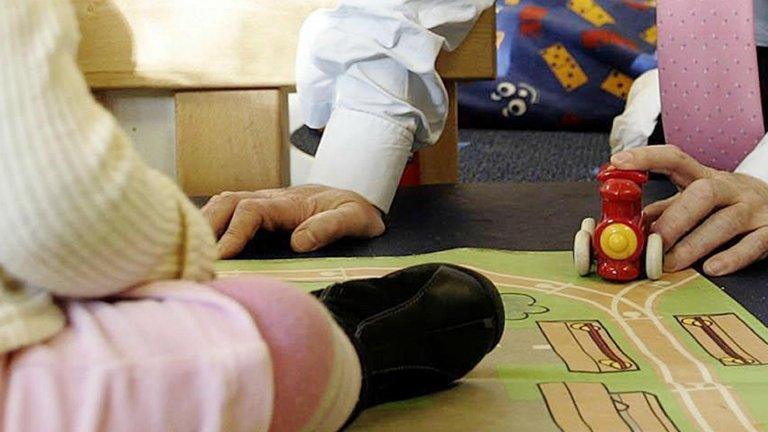Thousands on waiting lists for local authority nurseries
- Published
More than 12,000 babies and toddlers are on waiting lists for local authority nursery places
More than 12,000 babies and toddlers are on waiting lists for local authority nursery places, according to figures obtained by the BBC.
Despite childcare being a high priority for ministers, some families have been unable to get a place they can afford and that suits their working hours.
Others have been on waiting lists for more than two years.
The Scottish government said it was confident its pledge for extended provision would be met.
Ministers have committed at least £280m to further expanding childcare. Changes effectively begin next week.
Regional variations
Local authorities do not yet have to provide childcare for most children under three. And some families are on waiting lists because they have put their child's name down early.
But the figures show that provision varies widely across the country. And experts say that for some parents this means not being able to return to work.
A Freedom of Information (FOI) request to each of Scotland's 32 local authorities revealed significant regional variations. In some areas there are no babies or toddlers waiting for places, in others, such as Glasgow, there are 7,821 on the list.
As of 1 August, the Scottish government has pledged to increase the current statutory provision of childcare for three to five year-olds from 475 hours per year to 600, and to extend provision to vulnerable two-year-olds.
Flagship pledge
It is the first stage of their flagship pledge to extend childcare provision.
Jenny Gorevan works full-time. She says she was told in June by Glasgow City Council that her three-year-old daughter was to lose her funded place and that she would have to look elsewhere.
However, when she called more than a dozen other private nurseries with council partnership-funded places she was told there was no availability.
She said: "After that I started looking into the council provision. There are seven council nurseries within the extended area that offer full day places.
"Because I'm a working parent and I need full-day places, and none of them could offer me a full-day place. You fill out an application to be considered in September but there are waiting lists and no guarantee of getting a funded place.
"If you can't get an affordable, suitable place, it means it's not worthwhile going back to work. It means the amount you have to spend on childcare in order to have the hours you need to work - the cost of nursery is probably going to exceed that."
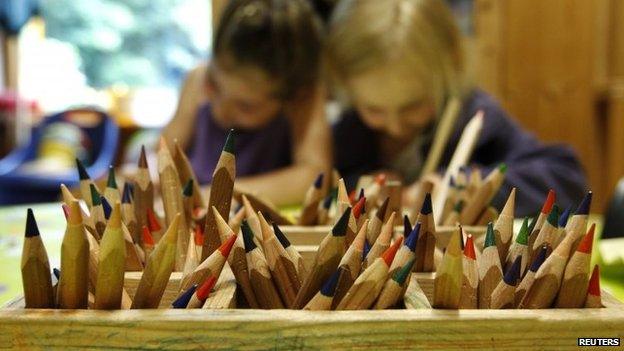
Some families will put their child's name down early in order to try to get an affordable place of their choice. In effect those children will get a place once eligible.
In Edinburgh, for example, parents are encouraged to place children on a waiting list around their second birthday in order to get a place of their choice aged three.
However, areas such as Glasgow have waiting lists that - in some cases - run for years.
Glasgow has also been accused of withdrawing funding for certain "partner" places in private nurseries. The FOI shows they have cut their overall childcare funding in the past 12 months from £52m to £50m.
Clare Simpson, of Parenting Across Scotland, said: "It's very difficult for parents to find childcare that is both affordable and flexible. It is piecemeal and very much depends on where you live. For poorer parents and single parents it becomes impossible to work."
Some councils offer no full-time places.
Double counting
Perth and Kinross currently offers no places for children under two.
Aberdeen City Council provides places from a child's third birthday. Last year their figures stated 245 children were "unplaced". And in the past five years 1,026 were unplaced.
Glasgow said some children on the list may be counted twice and said they have increased their spend on partnership places.
A spokeswoman said: "This figure will include a high proportion of double counting. Parents and carers will put their child's name down on numerous waiting lists - for both local authority and private nurseries - and don't always let us know if they no longer need a nursery place.
"Legislation states that the local authority has a duty to provide sufficient places for eligible three and four year olds. It does not specify that this is in the nursery of your choice. We do have enough funded places for three and four year olds across the city between our own provision and partnership nurseries.
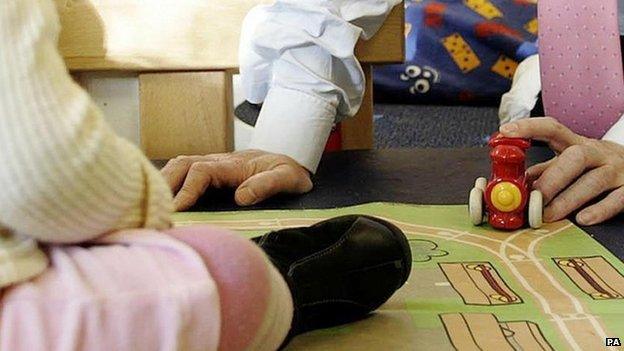
"The budget reduction is to do with the transfer of clerical staff from education services to CBS - so it is administration costs and not a reduction in frontline services."
In their response, South Lanarkshire said: "No children aged three to five years have been refused a place at a local authority nursery. A total of 277 babies (aged zero to two years) were not provided with places."
Aberdeen City Council said they provide nursery places from the term following a child's third birthday.
"One child can be on up to five waiting lists as children can apply for five choices (they can be on four waiting lists but still have a nursery place)," they said. "For session 2013/14 there are 245 children who have applied for but do not have any local authority nursery place. "
Edinburgh City Council said: "Parents are encouraged to register children for local authority nursery from their 2nd birthday. Two-year-olds on the waiting list for local authority nursery places will be allocated pre-school placements when they become eligible.
"0-2 year-olds are not entitled to a pre-school nursery place and are therefore not on a nursery waiting list. There are currently 563 vulnerable children 0-3 years receiving additional support in our Early Years Centres and 22 on the waiting list."
Waiting lists
A spokeswoman for the National Day Nurseries Association said: "If the local authorities commissioned more partner providers utilising the private sector rather than capping the number of children providers can take, there would be plenty of spaces.
"It would also mean funding would follow the child and open up parental choice as well as complying with children's rights. If this system were put in place there should be no waiting lists, just further commissioning, funded appropriately, of more places from partner providers.
"Free hours are not currently available until a child is three which is a long time after parental leave ends. The system at present is disjointed."
Cosla education spokesman Councillor Douglas Chapman said: "Cosla has always backed the principle of increasing the statutory hours of free childcare and early learning and staff across all councils have been working exceptionally hard to ensure that the recent expansion of provision is delivered.
"Some councils, due to a range of practical factors, have found that a challenging ask, however following continued discussions with the Scottish government we believe that we are in a good position to deliver for Scotland's youngest and most needy children."
Extra hours
The Scottish government said they are confident their pledge for extended provision will be met.
A spokesman said: "Parents are rightly registering with councils well before their child becomes eligible for statutory provision and many are captured in this figure.
"It includes a range of other scenarios, including requests for pre-school childcare for babies and children beyond those already entitled to funded provision, as well as families already receiving funded childcare who want either extra hours at, or a transfer to council-run provision.
"We have committed at least £280m over the next two years to expand funded early learning and childcare for three to four-year olds to almost 16 hours a week - 45% more provision than in 2007 - and for the first time to extend this to the 27% most disadvantaged two-year-olds, reaching around 15% of them in the first year.
"All local authorities have confirmed to us and to Cosla that they are on track to deliver this expanded entitlement. In the next few weeks tens of thousands of children will start receiving this increased provision, with more than 120,000 set to benefit over the school year.
"While we expect local authorities to meet their statutory responsibilities, clearly it is for each of them to decide how best to do that to meet local needs."
- Published25 March 2014
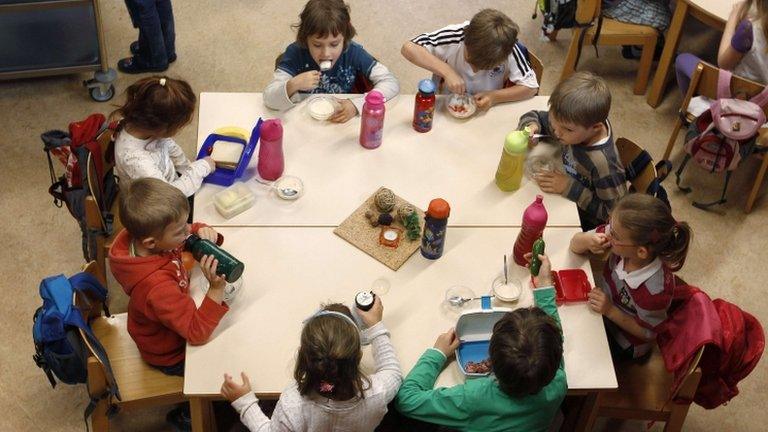
- Published12 January 2014

- Published21 November 2013

- Published25 July 2013
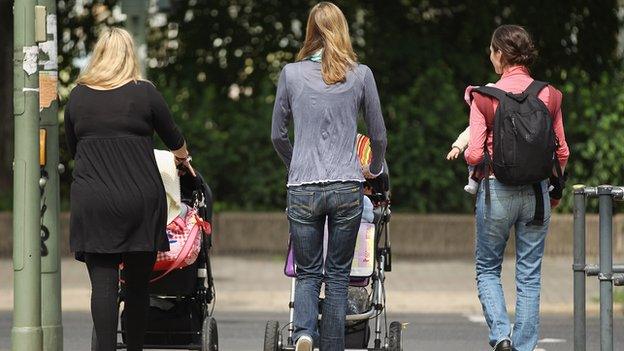
- Published18 April 2013

- Published24 January 2013
